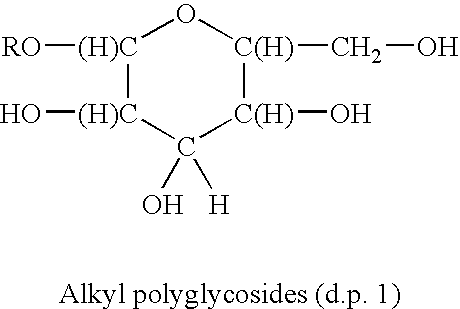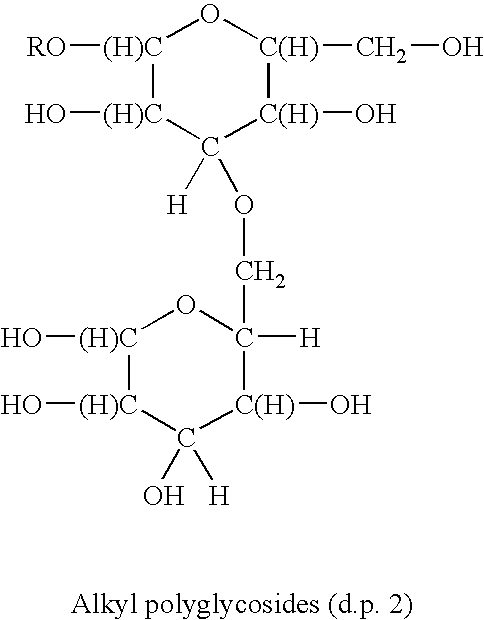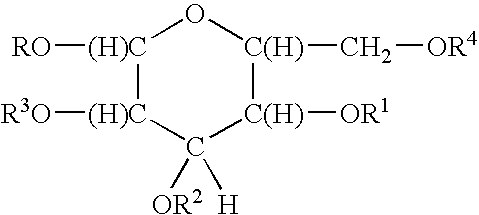Antimicrobial quaternary surfactants based upon alkyl polyglycoside
a technology of alkyl polyglycoside and antimicrobial activity, which is applied in the field of antimicrobial activity of a series of polyglycoside derivatives, can solve the problems of limited water solubility of molecules, unduly expensive, and general limitations of such use, and achieve excellent broad-spectrum bactericidal and fungicidal activity and effectiveness, and effectively inhibit the growth of a variety
- Summary
- Abstract
- Description
- Claims
- Application Information
AI Technical Summary
Benefits of technology
Problems solved by technology
Method used
Image
Examples
embodiment
Preferred Embodiment
[0036]In a preferred embodiment n is 0.
[0037]In a preferred embodiment n is 11.
[0038]In a preferred embodiment n is 13.
[0039]In a preferred embodiment n is 17.
[0040]In a preferred embodiment n is 19.
[0041]In a preferred embodiment n is 21.
example 1
[0050]A one-liter, four-necked, round-bottomed flask was equipped through its center neck with an overhead mechanical stirrer, through a second neck with a distillation head fitted with an addition funnel and a condenser / receiver / vacuum take-off assembly, through a third neck fitted with a three hole rubber stopper with a capillary nitrogen bleed, a calibrated mercury thermometer and a vacuum tight temperature controller probe, and on the fourth neck with a septum for sampling.
[0051]The flask was charged with 602.4 g (3.105 moles) of a commercial mixture of C11 to C15 (98% C12 and C13) straight and branched alkanols (Neodol 23 available form Shell Chemical Co.) and 136.6 g (0.69 moles) of a commercially available dextrose monohydrate (Staleydex 333, available from A. E. Staley Mfg. Co. at 9.0% moisture). The slurry was heated at a vacuum of 30 mm Hg (absolute). Water was released starting at about 57.degree. C. and heating was continued until the slurry had reached 110.degree. C. At...
example 2 – 8
Example 2–8
[0054]The same one-liter, four-necked, round-bottomed flask was equipped through its center neck with an overhead mechanical stirrer, through a second neck with a distillation head fitted with an addition funnel and a condenser / receiver / vacuum take-off assembly, through a third neck fitted with a three hole rubber stopper with a capillary nitrogen bleed, a calibrated mercury thermometer and a vacuum tight temperature controller probe, and on the fourth neck with a septum for sampling.
[0055]The flask was charged with 3.105 moles of the specified alcohol and 136.6 g (0.69 moles) of a commercially available dextrose monohydrate (Staleydex 333, available from A. E. Staley Mfg. Co. at 9.0% moisture). The slurry was heated at a vacuum of 30 mm Hg (absolute). Water was released starting at about 57.degree. C. and heating was continued until the slurry had reached 110.degree. C. At this time 3.2 g (0.00345 mole of a commercially available mixture of 50% dinonylnaphthalenesulfonic...
PUM
| Property | Measurement | Unit |
|---|---|---|
| Fraction | aaaaa | aaaaa |
| Fraction | aaaaa | aaaaa |
| Fraction | aaaaa | aaaaa |
Abstract
Description
Claims
Application Information
 Login to View More
Login to View More - R&D
- Intellectual Property
- Life Sciences
- Materials
- Tech Scout
- Unparalleled Data Quality
- Higher Quality Content
- 60% Fewer Hallucinations
Browse by: Latest US Patents, China's latest patents, Technical Efficacy Thesaurus, Application Domain, Technology Topic, Popular Technical Reports.
© 2025 PatSnap. All rights reserved.Legal|Privacy policy|Modern Slavery Act Transparency Statement|Sitemap|About US| Contact US: help@patsnap.com



